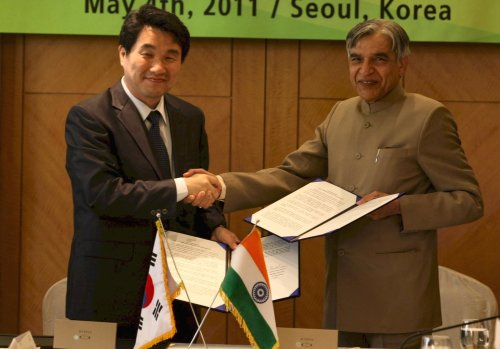Science and technology are two driving forces for the economies of South Korea and India, with tremendous potential for projects that link both sides.
To capitalize on this potential, India’s Science and Technology Minister Pawan Kumar Bansal came to Seoul to take part in the first Ministerial Steering Committee meeting on May 4.
 |
Education, Science and Technology Minister Lee Ju-ho (left) with India Science and Technology Minister Pawan Kumar Bansal during the 1st India-Korea Science and Technology Ministerial Steering Committee. (India Embassy) |
“We agreed on the need to promote human resource exchange and joint research in promising next-generation science and technology fields,” said Bansal.
Bansal and Education, Science and Technology Minister Lee Ju-ho exchanged views on the recent industry policy trends and recognized the importance of further strengthening cooperation in the field.
The two ministers agreed to launch an exchange program for those wishing to advance their education in engineering and medical sciences. The program will commence in the second half of this year.
The details for funding, scale and period will be discussed at a later date.
In response to the large number of proposals, 15 projects out of 129 were jointly agreed on for support.
To promote human resource exchanges, a memorandum of understanding was signed between the Korea Institute of Science and Technology and the Indian Department of Science and Technology.
Both sides agreed to develop mega research programs in mutually identified technology areas of importance to the two countries such as low grade coal based energy, biomass, nanoscience and technology and information technology.
The “India-Korea Great Innovation Science and Technology Challenge” will be organized in India next year.
Also, workshops in the areas of chemistry and biochemistry technology will run in the second half of this year while a workshop on health and medical science will take place next year.
The next Ministerial Steering Committee Meeting will be held in India in 2012 and every two years thereafter.
By Yoav Cerralbo (
yoav@heraldcorp.com)







![[Robert Fouser] Accepting migrants in South Korea](http://res.heraldm.com/phpwas/restmb_idxmake.php?idx=644&simg=/content/image/2024/10/31/20241031050896_0.jpg)
